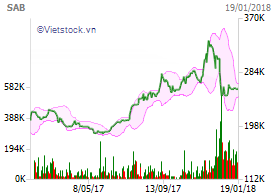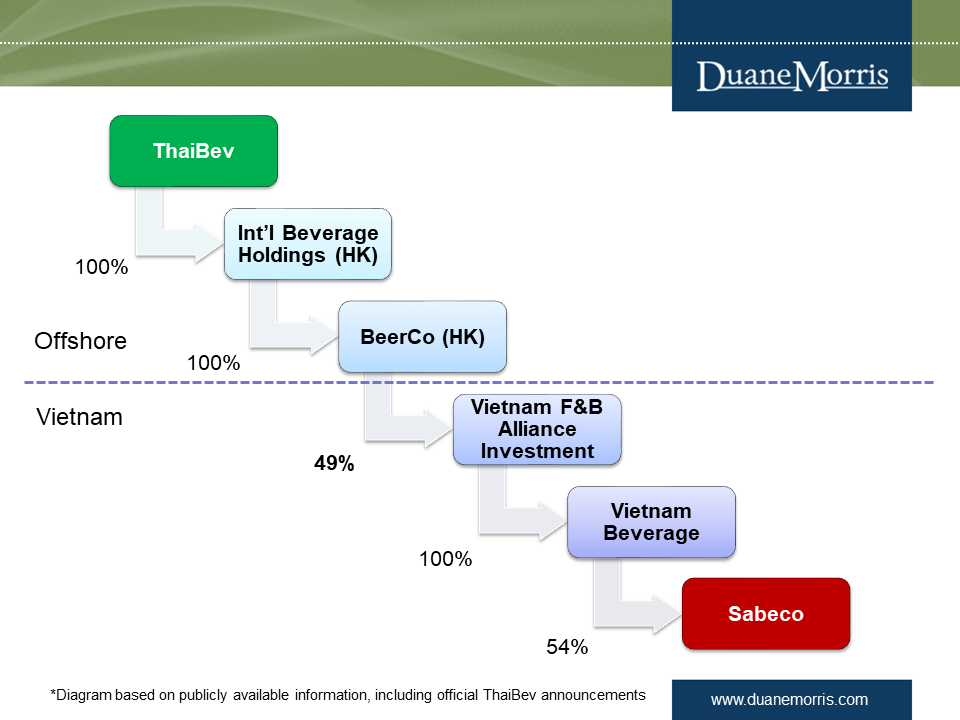23 January, 2018
Pros and Cons of the ThaiBev-Sabeco Structure
ThaiBev affiliate’s legal status as a Vietnamese domestic investor enabled it to acquire a majority stake in Sabeco, despite a foreign ownership cap of 49%.
Vietnam’s Ministry of Industry and Trade (MOIT) auctioned off a majority stake in Saigon Beer – Alcohol – Beverage Joint Stock Company (Sabeco) on 18 December 2017. The former State-owned enterprise has a 40% share of the Vietnamese beer market. The Thai Beverage (ThaiBev) affiliate Vietnam Beverage acquired a 53.59% stake for VND 110 trillion (or roughly US$4.85 billion) – a record for Vietnam.
No other companies – domestic or foreign – submitted bids despite much interest. One of the reasons could have been the high price. As seems to happen often in anticipation of such sales, within 6 months before the MOIT announced the auction, Sabeco’s share price had risen about 75%. Vietnam Beverage paid VND 320,000 per share – a 2017 P/E ratio of almost 47 times. The price fell quickly after the deal went through, and the shares have been trading within a narrow band around VND 255,000 for the past few weeks.
Besides the price, the other main reason for international investors holding back could have been a combination of Sabeco’s foreign ownership limit and the timing between the official announcement, bid registration, and auction date. Even ThaiBev admitted in its 22 December 2017 Singapore Exchange (SGX) filing that the timeline for the submission of bids was “extremely tight” and that they had to make compromises, including not obtaining official shareholder approval in advance and in terms of financing of the deal. While timing is very important, we will take a closer look at Sabeco’s foreign ownership limit and legal structure of ThaiBev’s investment here. Understanding the structure first can help investors to position themselves for future deals and meet tight deadlines.
The ThaiBev-Sabeco structure
We illustrated the legal structure of ThaiBev’s investment in Sabeco in the following chart based on publicly available information. We have suggested this structure since 2015, when Vietnam’s then-new Investment Law came into force. Our interpretation of Article 23 of the Investment Law is that subsidiaries of companies registered in Vietnam with a foreign ownership of less than 51% can conduct investment activities under the same conditions as domestic investors. The Sabeco deal confirms the validity of this structure in practice, even for bigger deals, and that foreign ownership limitations do not apply to such subsidiaries.
Here, Vietnam Beverage is a wholly-owned subsidiary of Vietnam F&B Alliance Investment Joint Stock Company (Vietnam F&B). ThaiBev’s indirectly wholly-owned subsidiary BeerCo Limited, a Hong Kong company, owns 49% in Vietnam F&B. Because BeerCo’s stake in Vietnam F&B is less than 51%, Vietnam F&B’s subsidiary Vietnam Beverage is not subject to investment conditions that apply to foreign investors. Therefore, Vietnam F&B could buy Sabeco shares as a domestic investor.
Sabeco’s foreign ownership limit
ThaiBev announced that it chose the above domestic-company structure to acquire a majority stake in Sabeco, because of Sabeco’s foreign ownership cap. Under Vietnamese securities regulations, foreign investors can only own up to 49% (in aggregate) of a public company where the company has registered so-called “conditional” business lines (unless otherwise provided by international treaties or domestic law).
A conditional business line is an activity that is subject to additional requirements, such as a special business license. Like many Vietnamese domestic companies, Sabeco had a long list of registered business lines, including conditional activities, e.g. – distribution and real estate trading. (By law, a company in Vietnam must register all its business activities.) Without substantially restructuring its business, Sabeco’s sale to foreign buyers was limited. Considering the 49% cap and that foreign investors had already owned 10.4% of Sabeco (including Heineken’s 5%), less than 39% of the total 54% for sale in this round were available to foreign buyers. But as a domestic investor, ThaiBev’s affiliate Vietnam Beverage could buy a majority stake.
To what extent does ThaiBev control Sabeco?
The 4.8 billion-dollar question is ThaiBev’s level of control over Sabeco. Although, Vietnam Beverage has a 54% majority stake in Sabeco, Vietnam Beverage is wholly owned by Vietnam F&B, where ThaiBev’s wholly-owned subsidiary BeerCo owns only a minority stake.
Politics and other levers aside, from a pure legal perspective, the general meeting of shareholders (GMS) can pass ordinary resolutions with approval of attending shareholders representing at least 51% of the votes. Special resolutions require at least 65%. Likewise, decision in the board of management (akin to a board of directors in some other jurisdictions) require a simple majority of all attending board members. Although, Vietnam’s Enterprise Law permits that companies stipulate higher voting thresholds in their charters, Sabeco’s most recent publicly available charter sets out the same default 51% and 65% ratios for the GMS and 51% for its 7-member board. Therefore, Vietnam Beverage can now unilaterally control ordinary resolutions of Sabeco’s GMS (except for related party transactions) and can vote its nominees to the board.
However, ThaiBev may not fully control Vietnam Beverage, because it only has 49% minority stake in Vietnam F&B. Two Vietnamese individual shareholders own 51%. According to ThaiBev’s 22 December 2017 SGX filing, “One of the Vietnamese investors in Vietnam F&B is a business person [who] is in the same group as the Company’s distributor of alcohol beverages in Vietnam. The other Vietnamese investor is the Company’s local business consultant [who advised] the Company in relation to the [Sabeco acquisition].”
This raises a number of questions similar to those that arise in nominee companies in Vietnam: How much control can ThaiBev/BeerCo exert over the two Vietnamese shareholders in Vietnam F&B?
- Did BeerCo and the Vietnamese shareholders enter into a properly drafted shareholders’ agreement and approve a charter for Vietnam F&B with reserved matters and other guards to give BeerCo more control? (NB: Vietnam’s Enterprise Law permits voting preference shares only with Government approval and only to founding shareholders for maximum three years.)
- What happens with the dividends from Sabeco/Vietnam Beverage – will the two Vietnamese shareholders get 51%? (Dividend preference shareholders have no voting rights, so that wouldn’t be in BeerCo’s interest.)
- Can ThaiBev buyout those Vietnamese shareholders? How much will it cost? (The market value of Vietnam F&B should be sky high now.)
- What if they sell their stakes to a competitor?
- Will the courts enforce the shareholders’ arrangements when contested (less than 30% of Vietnamese court judgments are enforced in Vietnam; let alone foreign arbitral awards)?
We do not know for sure, as Vietnam F&B’s documents are not public, but those are a few of the potential risks of the ThaiBev-Sabeco structure.
New Investment Law and management committee for SOE equitization
It is important to note that Vietnam is in the process of amending its Investment Law (again, after less than three years in force). The first published draft has revised provisions that affect M&A activities – including the dreaded pre-M&A approval requirement. The ThaiBev structure may or may not work in the future. At the earliest, we expect the new law to come into force in 2019. So, upcoming SOE divestments including Habeco, PV Power, PV Oil as well as the sale of the MOIT’s remaining 35% of Sabeco might still be in time to apply the above structure if they close in 2018.
In addition, the Government plans to establish a new State capital management committee to coordinate divestments of all State-owned assets taking over powers from the various ministries and State Capital Investment Corporation (SCIC).
Pros and cons of the ThaiBev-Sabeco structure
+ Allows foreign investors to participate in investments under the same conditions as domestic investors.
– No full ownership and limited control over those investments.
For further information, please contact:
Manfred Otto, Duane Morris
motto@duanemorris.com







